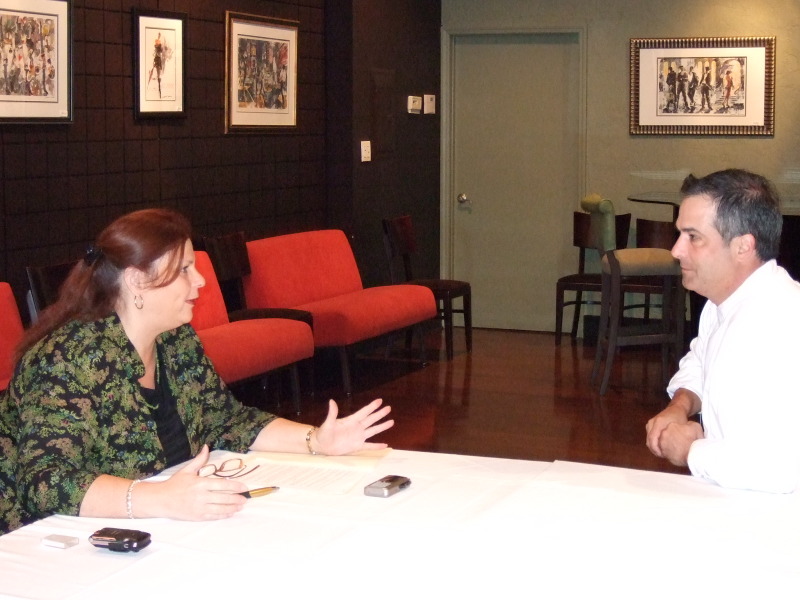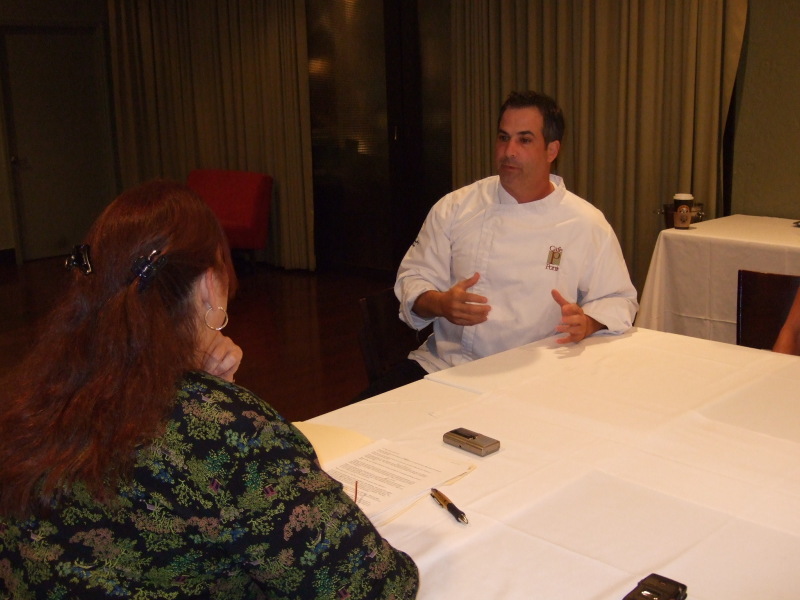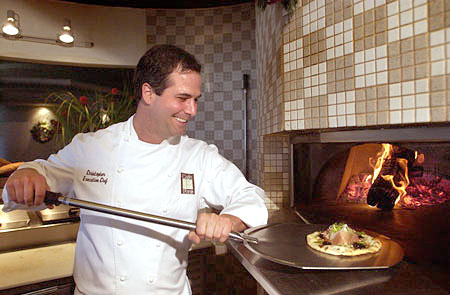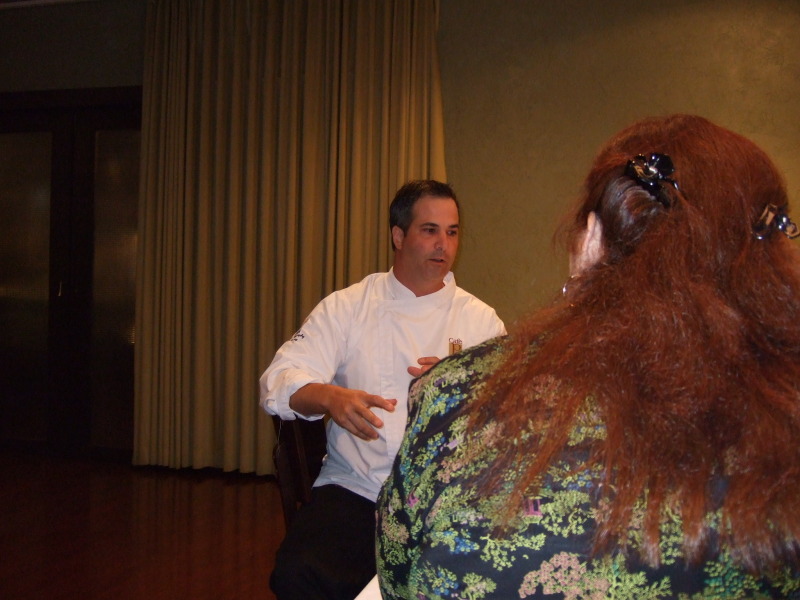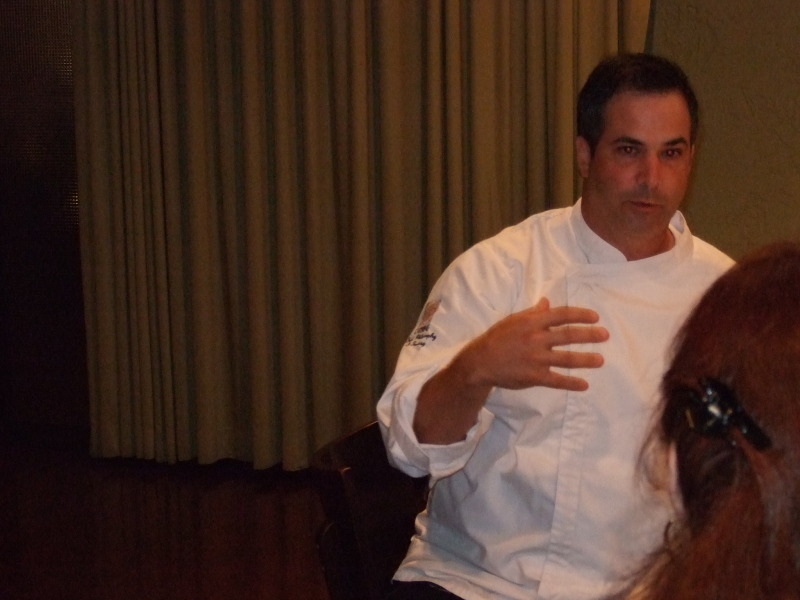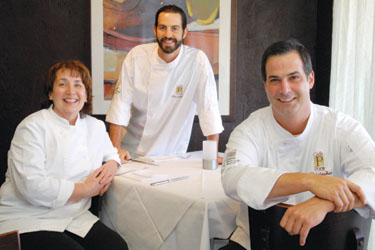Chris Ponte, Cafe Ponte, Clearwater, FL
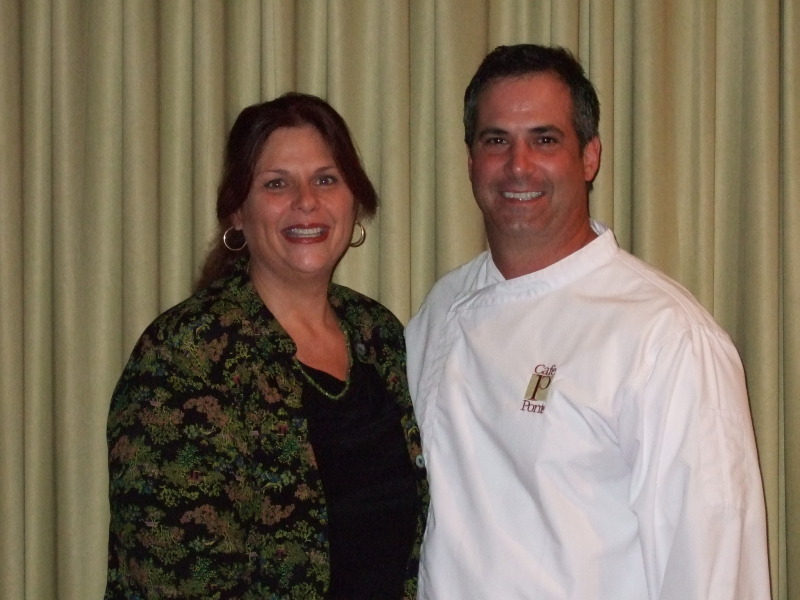 Born 40 years ago in North Dartmouth, Mass., Chris has been cooking and working in restaurants since he was 16. Ponte (pronounced “Pont”), began his culinary career at Clearwater's Pepper Mill Restaurant in 1991 after graduating from Johnson & Wales University in Providence, Rhode Island.
Born 40 years ago in North Dartmouth, Mass., Chris has been cooking and working in restaurants since he was 16. Ponte (pronounced “Pont”), began his culinary career at Clearwater's Pepper Mill Restaurant in 1991 after graduating from Johnson & Wales University in Providence, Rhode Island.
Most chefs will tell you that catering to special requests from patrons can mean a great deal of additional work, especially in a busy kitchen. After many months of such service to one particular customer, the guest asked to meet the chef, thanked him and they began to talk. “What would the young man like to do in the future?” he asked. Ponte answered, “Study in France .” The patron, a Long Island, N.Y. retiree, who had no local family, gave the chef money as if he was his son. Shortly after that introduction, Ponte was studying the culinary arts in Paris at the Cordon Bleu, France 's iconic culinary institute. Ponte achieved his degree at the top of his class and, upon graduation, was hired as an apprentice at the famed Taillevent, also in Paris. With over six years of experience in arguably the most prestigious culinary settings in the world, Ponte took his expertise into the private sector when he accepted a job as personal executive chef for New York entrepreneur Leon Black. Ponte coordinated daily meals for Black's three New York homes as well as catered corporate events and private dinner parties. On the weekends, Ponte would take unpaid apprenticeships with some of New York 's most critically acclaimed restaurants including that of Daniel Boulud. This enigmatic chef is full of energy and vision and it seems he never sits still. A devotee of charities, he is warm and genuine, with a bit of a mischevious twinkle in his eye. We recently caught up with him at Cafe Ponte. It is our distinct pleasure to bring you Up Close and Personal with Chef Chris Ponte.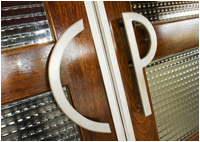 With much experience and training behind him, Ponte began investigating opportunities to create his own culinary legacy. When he began looking for a geographical locale to open his first restaurant, his fondness for Florida and his West Coast connections led him to the Tampa Bay area where he opened Café Ponte in 2002. The restaurant, critcally accaimed, and voted to Nations Restaurant New's 'Fine Dining Hall of Fame 2008', was the topic of conversation with management and staff when we recently sat for dinner at "Gordon Ramsey at the London Hotel in New York". It seems his reputation for stellar service and cusine has trancended the Tampa market and quite regularly, Wolfgang Puck, who has become one of Chris' friends, frequents the restaurant.
With much experience and training behind him, Ponte began investigating opportunities to create his own culinary legacy. When he began looking for a geographical locale to open his first restaurant, his fondness for Florida and his West Coast connections led him to the Tampa Bay area where he opened Café Ponte in 2002. The restaurant, critcally accaimed, and voted to Nations Restaurant New's 'Fine Dining Hall of Fame 2008', was the topic of conversation with management and staff when we recently sat for dinner at "Gordon Ramsey at the London Hotel in New York". It seems his reputation for stellar service and cusine has trancended the Tampa market and quite regularly, Wolfgang Puck, who has become one of Chris' friends, frequents the restaurant. 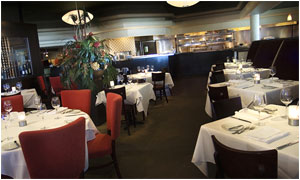 Local area culinary guru Tom Pritchard, chef-partner of the Salt Rock Grill in nearby Indian Shores as well as several other area restaurants has been quoted to say, When Ponte opened his restaurant, he had the most innovative presentations of anybody in this town.” Today Pritchard visits Cafe Ponte at least once every few weeks. "“I stop in the bar and spy on what he’s doing and have a glass of wine,” he says.
Local area culinary guru Tom Pritchard, chef-partner of the Salt Rock Grill in nearby Indian Shores as well as several other area restaurants has been quoted to say, When Ponte opened his restaurant, he had the most innovative presentations of anybody in this town.” Today Pritchard visits Cafe Ponte at least once every few weeks. "“I stop in the bar and spy on what he’s doing and have a glass of wine,” he says.
After discussing Gordon Ramsey’s dining room in the London Hotel, NYC, Chris volunteered a comparison of the service experience oversees with what we experienced when we dined at Ramsey’s. This came up because the management at Ramsey's were well aware of Chris and his stellar reputation. Chris Ponte: In France, Paris you experience service like that. I can’t tell my staff enough, 'You guys are great but there are levels of service above what you do that you don’t even realize exists." It's like, there is a server for each individual patron. At Tru in Chicago, I was impressed with the laying of the silverware, simultaneously. It’s very impressive, very elegant. GG: Having had the 3 Star Michelin experience in the back of the house and as a patron, would you agree that there is high end and then exclusive high end when it comes to service? We can be wowed so easily at high end restaurants and then you experience something like Ramsey’s level of service. At the time of the dining experience you really aren’t fully cognizant of what takes place because the servers are stealthy and unobtrusive. CP: That’s a perfect word - stealthy. They’re in and out and you don’t know they’re there. GG: That level of service allows the diner to truly embrace the ‘full dining experience’ which you talk about so often. CP: When I go out to dinner, the people I’m dining with must think I’m nuts. I’ll go to the bathroom 3 or 4 times just to cross over other people’s tables, to see what they’ve ordered. It’s all eye candy for me, I’m intrigued with it. GG: I compare a good dining experience like visiting an art gallery or museum. Dishes that are vertically plated remind me of sculptures and of course the 'art on the plate' compares with paintings. CP: Exactly, I feel like with us (chefs) as artists we can only touch a person for the moment. It’s not out there on the wall, you can’t come back time after time. The upside though is that we can touch people in a lot of different senses at once. Tasting the whole creation, the whole night, the whole memory. You look at a painting and all your stimulation is visual. We have the visual aspect plus other sensory feeds: taste, smell, touch (the textures in your mouth). A painter has one stimulant to offer, we (chefs) have four. GG: To me the kitchen artist’s task is more difficult. CP: Unless it is captured on film, the art is gone in a fleeting moment. Only the memory remains. GG: However, when you create a dish that people can’t stop talking about, you have the capability of creating a legacy. CP: You are absolutely right. I believe everyone has their virgin moment of dining. My first time was the King Charles Room at the Don Cesar (St Petersburg, FL). I was young, 21. I didn’t grow up exposed to fine dining as a patron, but I always worked in that type of restaurant. I knew it was my passion. I remember the gentleman, John Manning, who took me there. He wanted to expose me to that type of dining. Food is not just something that you eat, a need, it’s more than that. That’s what he taught me. When I went to Eric Niri, he did a beautiful dinner for us. I remember I was ‘wowed.’ It was then that I began to understand the full dining experience. Even back at the age of 16, I knew that was what I wanted to do, but I couldn’t afford to go to those restaurants at that time. John also took me to Baloud’s in NYC, Daniel’s first restaurant in the 90s. It was that experience that confirmed that this was what I wanted to do. GG: Let’s start at the beginning. Where did you grow up? CP: I grew up in MA, the Fall River area (that’s where Emeril is from). Very prominent Portuguese town. Big fish and scallop town. All my friends and family were basically scallopers. My first restaurant job was while I was in high school, I was a busboy. I was eager to learn about the business. My sister and I would go berry picking often. We’d bring them home and make compotes, jams and jellies with my grandmother. I was always around the kitchen, my mother would tell me to get out (laughter). After high school I went to community college, while continuing to work in restaurants. I was always in the kitchen cooking stuff with friends, trying out different things. My mom said, "If you really like cooking why don’t you go to Johnson and Wales." I hadn’t really thought that I could have a career as a ‘chef.’ I took her advice and I enrolled. I still worked, at Joseph’s Old Tavern Inn while I went to school. The chef was a great guy, traditional French, really tough. That’s where I developed my speed on the line. To be a good chef, you have to be fast. You have to be able to put out food at a high volume. We were 3 guys on the line doing 125-150 dinners every night. GG: How did it feel to go from a small kitchen, to school and Joseph’s (big kitchen)? CP: I was very intimidated, I felt clumsy and was definitely out of my realm. There were kids that had experience. For the first time I felt very challenged. I loved what I was doing. I felt like I didn’t know enough and was struggling at times. Finally, I made the decision that was what I wanted to do and to focus on it. I put my energies into the artistic side. Food is not just about work, it is also about the artistry. My work at the restaurant helps me to see that. They said to me, "You are so excited about food you should go to work on the Cape, (Cape Cod) at a fine dining restaurant." GG: How did you handle going from an instructional setting (Johnson and Wales), learning techniques, etc. to the fine dining setting actually implementing what you learned? CP: I had a little more confidence after school, I felt better about cooking. I was good at being shown how to do something once and then replicating that a hundred times. I could do it better and faster than anybody and that is what they needed. I worked for them for 3 ½ years. I wasn’t a gypsy, working just for season and then leaving. I remember every Friday and Saturday night I’d have butterflies in my stomach. There were so many tickets (orders), you'ld get so buried, you don’t even know where you are. You're ready to cry and walk away. It pushes you to the boiling point every single time. I got an adrenaline rush from it. It became a mission for me to keep pumping out ticket after ticket. That was when I was more of a machine. I wasn’t really developing into an artist. I wanted to develop my skills. GG: The mechanics and foundational elements? CP: Yes, it was more of an ego thing. "Come on, throw some more tickets at me. I'll burn you on the line anytime." (Laughter) A pride thing with chefs. Who can push it out? To this day I can see who are the 'line dogs,' the guys that are really entrenched. You don’t need a guy that can fluff it up and only put out one plate at a time. You’ve got to have the ability for speed. Clean and fast. That’s a great chef, a good line guy. Anybody can make these beautiful dishes, tower high and elegant. But if you can’t get them to the guests on time, every single time, then what good are those dishes. GG: You don’t serve 5 guests per night. CP: Exactly. Ultimately it’s a business and that’s where you have to be creative. You have to be profitable. You have to be about business and that’s the struggle as a restaurantuer. GG: You mentioned you were intimidated when you first got to Johnson & Wales. What was so intimidating? CP: The size of the school and not really knowing anything. I remember one thing in particular. This girl was next to me. I was so embarrassed. It was such a little thing. I brought up eggs to do the rotation and put them on top. She says to me, cockily, many people there are kind of cocky, "You’re supposed to rotate them." I say, "Yeah, you’re right, put the old ones on top." It was little things like that, that I was trying to get used to. Now it’s second nature. GG: That’s the learning experience. Better to do it in that setting then in this one (his restaurant). After school where did you go? CP: I remained at Joseph’s. Lou: Was it an internship? CP: No, I had to work while I was in school and for a period after I graduated. I then had an opportunity to move to Florida. Joseph’s asked me to stay for 6 months because the chef was dealing with carpal tunnel. He said he’d show me everything he knew if I stayed a little longer, which I did. I’ve actually taken one of his oyster sauces, my favorite, and altered it to what I use today. That was 20 years ago and I still use things I learned, but turned and modernized them a little bit. Lou: Do you feel he is the chef that shaped you? CP: No, I think every chef shaped me in some way. I didn’t have a mentor. I’ve taken something from each of them. Something I saw in them that I wanted to bring to my table. He had great sauces. GG: Was there anything pivotal up to this point in your career?
CP: Not yet. The public’s attitude about becoming a chef back then isn’t like it is today. Chefs didn’t have star status. Everybody was saying to me, "Oh, you want to be a chef, that sounds nice." I got into the business because of my passion for food. I hope kids today don’t get into this because of the 'stardom.' If they are, they are barking up the wrong tree, I’ll tell you that. At that time, the New England area, Boston, wasn’t offering any great restaurants. I was in a fishing town. We were getting the best baked, stuffed shrimp, oysters, scallops and Maine lobsters. That’s basically what the food style was. I wanted to learn more. I was starving for something. I wanted to move to Florida and check out the Caribbean, Floribbean food. From Fall River to Florida, a major difference. A bunch of my buddies and I came down and stayed in my parents summer house. I began looking for jobs and went to places like the Black Swan because I knew it was great. I went to Tom Pritchard’s place and actually spoke to him. People weren’t hiring at the time, so I ended up taking a job at the Radisson on the beach, were I learned how to cook breakfast. It was the only job they had at the time, 5 a.m., oh my God! I told myself, "Everybody needs to learn how to cook breakfast." I’ll use it as a positive experience. Someday I’m going to need to know how to do eggs and I’ll have it under my belt. I did that for about 8 months. It was very beneficial to my future. At that time though, I didn’t know it would be. After that, I ended up at the Pepper Mill. The rate of pay was $6.00-7.00 an hour down here. I had been making $13.00 an hour at age 18 in Massachusetts. I worked for about a year and told the chef, "I think I’m going back to school to become a chiropractor or something where I can make some money." I remember him telling me if I was going to do it I better do it now. I was 22 and had to make a decision. I was bummed out about it. I made the decision to stay a little longer. We had a gentleman that came in every Sunday. He would ask for certain things, he obviously had cancer but I didn’t realize it at the time. Everything was plain but I would take the time to make his vegetables look nice, his broth and soups too. The guy was very nice. GG: You were the sous chef. The likelihood of a sous chef providing such personalized service to a customer as you did, to me, is rare. What prompted you to be so attentive? CP: I think it’s just built in me. You’re either hospitality or you’re not. You can tell when people are meant for this or just going through the motions. A hospitable person wants to take care of you and that is what this business is about. People forget that. It’s about giving to other people and making sure they are comfortable in your environment. I can’t really put a finger on why I did it for him. I think I would have done it for anybody. John was a person that was very nice. He’d always say hi. We developed a relationship. GG: You were putting your personality into your plating. CP: Absolutely. During my time there I came to a point when I decided this wasn’t for me, I was done, I was moving back to Massachusetts. I can go fishing and make $10,000 in 3 weeks. GG: Turned back to being about money. CP: Yes, it does that for a lot of guys. That’s a learning lesson too. I told my boss, customers, including John, that I was leaving. He came and gave me a $75.00 tip and in a letter thanked me for all the wonderful meals, saying I was truly talented. I go back to New England, walking the docks looking for work, with my duffle bag ready to jump on the boat. My mom didn’t want me to go scalloping. Lou: You actually did the ‘Deadliest Catch’ thing? CP: Not me, but they (the fishermen) did. Many would go to Alaska to make crazy money in a short time. I was looking to be a cook, shucker or whatever on the boat, but nothing came up. During this time, about 3 weeks after I left, the owner of the Pepper Mill calls and asks me if I want the executive chef position. We worked out the details and I accepted the job, heading back down to Florida. John was still a faithful patron and we continued to develop our relationship. I catered a small party for him during that time. After about a year, year and a half, he asks me, "Chris, where do you see yourself in 5 years? What is it you want to do? Do you really see yourself here for the rest of your life?" As a kid you don’t think about that stuff, you take it as it comes. It made me really think about what I wanted to do and where I wanted to end up. I set goals a little higher for myself. GG: Up to this point as you are discussing your professional history, you haven’t said a word about aspirations for Cordon Bleu. Yet when he asked you about your ‘dreams’ it is the first thing you said.
CP: Every chef wants to go to France and travel and train there. At the time it was the place to go. It wasn’t NYC or Chicago, like today. Boston wasn’t even alive. NYC was very good, but it was limited. During that time he took me to NY and said it was the place I needed to be. He grew up on Long Island. In the meantime I tell my mom about him and that he wants to send me to Paris for training. A typical mom, she wants to know who he is and wants to meet him. She was very upset. So my parents came down and met John and found out that he was the real deal. I really didn’t want to go back to school, but the information about Cordon Bleu said, ‘Train for a year and half and then you get to do a 'stage' (pronounced; staj) in Paris." That’s what I wanted to do, work in Paris, not just attend school there. John said if that was what I wanted, to go to Cordon Bleu, then that’s what we’ll do. I’m thinking, this costs $60,000! GG: You had developed a relationship with John and even after you left and came back that relationship remained the same and then grew. Not many people can say that. You have the admiration of many in the food world both here in Florida and beyond. What do you think it is about you that draws people to you? CP: I’m as good as my last plate. It’s not all about the glitz. I am a shy person. I like to cook! The other night I had people from the Melting Pot in for dinner. They were surprised that I was cooking on the line. I told them that’s the part of it that is fun, putting the food out. You can’t forget that. I think that’s my true asset. I don’t want tunnel vision, I want to focus on the food and serving people every night. I don’t want to get too big. GG: You want to remain real. CP: Yes, that’s it precisely. I want to stay real. If you become something you think you are, then you forget about where you came from. I liked to be honed in on the food every night. Creating. Lou: When we talked about 'art on the plate' and the artistry, you come back to the bottom line: it being the food. "When I put that fork in my mouth, it doesn’t matter what you’ve done around it, how pretty it is. Did you deliver on the plate?" CP: Exactly. Lou: Making sure that one plate is on the money. CP: Absolutely. I hate not to be here sometimes. Sometimes I can’t be here. She (Michelle, his girlfriend) is helping me to balance my life. If it wasn’t for her I’d be here entrenched in the line. Not really growing as a whole person. I think it has helped me develop into a better chef, being balanced. When I get upset that I can’t be in the restaurant, she reminds me that it’s going to be okay because I have great guys working for me. GG: "Quality and simplicity are the keys to success." It’s your mantra. Other top chefs have told us, "You think one day owning your own restaurant will be so awesome. Yet once you have one there’s little time to appreciate it." However, with Michelle’s support, you seem to be finding a way to enjoy it all. CP: It’s a growing process. You are always learning about every aspect of the restaurant. I love to take a step back from the line and watch my guys. The rhythm, it’s just beautiful, a wonderful thing. I’m very fortunate. People want to work for me for free. It’s quite an honor. I never would have thought that would happen. I thought really small. GG: Similar to aspiring chefs who clamor to work for Daniel, Jean Georges, etc, cooking ‘geniuses.’ Many young chefs will never have an opportunity to study and work in France like you did, especially a 3 Star Michelin rated one, Traillevent. What are some of the things you took away with you from that experience? CP: What I got out of the whole European experience was their passion for food, for the table.Their society is built on food. When they wake up, they are thinking about what they are going to have for lunch. In the afternoon, they go and pick their dinners. Everybody stops and they all sit down have lunch together. The passion for food, every woman and man, going to the market to shop for their lunch and dinner. It’s such a beautiful thing to see. It’s so amazing that people are that involved with food as I am. Lou: Correct me if I’m wrong. It’s not just the eating. CP: It’s what happens at the table that I think is so important. It is lacking in this country. Kids are going here and there, but it’s mandatory to have a meal together there. Sunday meal is every night there. I think they’re slipping into our ways; car pooling, pre-packaged meals, etc. GG: We’re (the U.S.) definitely pushing our lifestyle on the world. CP: I went to school. My first chef was phenomenal, looked up to him, Christian Guyeault. He came to me and said, "If you help me with this, a Moet dinner that the Cordon Bleu was going to do, he’d get me this stage, no problem. His best friend was the chef, Pierre Lejaunt at Traillevent at the time. Up to that point in time, no one from Cordon had gotten a stage there. I worked hard and had finished first in all my classes and was the number one guy. I remember walking up the Champs Elysses, scared out of my mind. Every step closer I got to the door I wanted to turn around. I had to tell myself, " If there was any time to suck it up, now was the time." GG: You weren’t fluent in French were you. CP: No, I walk in with my terrible French and introduced myself to the chef. He tells me I’ll start that week in pastry, upstairs. When I get there I ask if I can help them out and they tell me ‘No, no, you can’t touch, just stand an watch." For weeks I’m doing that, thinking ,"I’m never going to learn anything here." Meanwhile dishes are always piling up, so I started washing them. They tell me I don’t have to do them, but I’m there and might as well so we can get out of there (when the day is over). Then I started cleaning the floor, mopping up. You had to work in order to get ‘in’ with them. Slowly but surely, they allowed me to help out. We started to have a good time teasing back and forth, they called me Mr. McDonalds. I did whatever needed to be done. GG: Where was the cuisine kitchen? CP: They were downstairs and they had heard about what I was doing, a good job. Not a typical American. They kept telling me wait till I got to cuisine, that’s were it was really at, they were going to hammer me. Really teasing me. I told myself I’ve been there (cuisine kitchen) before, I know what it’s all about. First day in cuisine I get 8 crates of mushrooms. GG: Our Executive chef Brian had crates of mushrooms his first day at Daniel’s. Are mushrooms an initiation fungi? (we all laugh). CP: Must be, it took hours and hours, but my hands were working no problem. Next came crate after crate of artichokes. I just did them as fast as I could. GG: They were checking your endurance. CP: If you want to play with the big boys then you’re not going to go into their kitchen and be a prima donna. They want to see what you’re made of and if you’re going to make it or not. Next I moved to the line to help them plate. You could NOT touch a plate. Every chef had napkins that would touch the plate. GG: You had to be meticulous. CP: I learned how to cut herbs, I remember chives especially. I learned to use the tips of the chives and as you go down, you used different parts for different things. You don’t use the base of chives except for certain things. The attention to detail included removing the stem of basil because it’s too chewy. Remember these are 17 and 18 year old kids who are trained young. | GG: Were you the old man of the group? CP: I was ‘middle-aged’ (26). The sous chef was 35-40 and the chef de cuisine was 45-50. It was a phenomenal experience working there. It’s also a small world. One day this red headed kid with a backpack came looking for a stage and we started talking. Years later when I got to Daniel’s, I came to find he was the sous chef there. I ended up working for him. GG: We are learning just how small the food world really is. CP: Funny story - the whole time at Traillevent everyone is speaking only French. I was trying to learn from them with my terrible French. As I ended my time there I said, "Merci beaucoup." The chef answers in perfect English, "No problem." The whole time he made me speak in French. He told me when someone works in his kitchen they speak French. GG: In his defense, he actually gave you a gift. He forced you to work harder to be part of the full French experience. He challenged you and obviously you were up for that challenge. Now let’s cross the Atlantic. CP: After school I went to Miami to work for Mark Millatel I had heard he was the up and coming chef in Florida at that time. I worked with him for a little while but was disenchanted. Coming from Traillevent, one of the top 5 restaurants in the world, to a kitchen in Florida was very different. During my time there I saw all these yachts coming and going and made inquiries. At the time I was barely able to make payments on my place in Miami and needed to make money. I was able to get a position as the personal chef for Randy Aggly and traveled with him for 3 ½ years through the Mediterranean, Carribean and Turkey. As great as that was, I really wanted to get back to the kitchen. I felt like I was losing time, being so regimented. At that time being on the ship gave me a little bit of a break. I could enjoy the lifestyle. It afforded me the opportunity to learn a lot about the different cooking styles and experience amazing food. Like the bouillabaisse from the south of France and talking with local people and going to markets everyday. GG: Marcus said that without those experiences, he wouldn’t be the chef he is today. He told us that experience opened is eyes and palate, not just to spices but to techniques. It is evident in what he is producing in his restaurants and his cookbooks. What stands out for you from your travels? CP: Two experiences in particular: the Istanbul markets, with the spices and kabobs, and the foccacia of Portofino, the best I’ve ever had in my life. GG: Is there a spice or product that you use differently now? CP: I use long peppers, they’re like anise, not used a lot. I love them, they are in our 9 spice in the duck. I agree with Marcus, tasting people’s food in their natural element is amazing. You develop your palate and understanding of what great food is all about. GG: How did you end up working for Leon Black? CP: At this point I had saved some money and bought my house here in Clearwater. I was tired of waking up in one place one day, say Monte Carlo, and somewhere the next, perhaps Italy.
GG: You wanted some roots. CP: Yes. I figured I’d go up to South Hampton, do a summer gig up there for some extra money. Leon really liked how I cooked, he said if I stayed with him he’d take care of me. He wanted me to open a restaurant in NYC but I wanted to be back in Florida. He helped me out with a little bit of this (Café Ponte). GG: You were also doing some work with Daniel and others. CP: John Manning always said you need to be in NYC and I had always heard about Daniel. The limo picked me up to take me to Leon and I’m talking to the driver about Daniel. The driver says to me Daniel is good friends with Mr. Black. I’m thinking this is a sign. That was kind of enticing too and when I told Mr. Black I was going to stay longer, that I’d like to be able to work with Daniel, he said no problem I’ll get you in. He got me in to work with him over the period of time I was there. On the weekends I’d go into the city and work at the Café and also worked with Francois Pyard. GG: They are both perfectionists and uniquely different. CP: That’s true. Francois was Daniel’s pastry chef and he went off on his own. I remember when I walked in, Daniel was outside filming and I’m thinking, this guy’s a legend. I’m thinking what am I getting myself into, a throwback to walking to Traillevent. This is the guy that can make shoes taste good. Watching him during my time there, he is just amazing what he does with food. How he reduces sauces. I always thought to take the creme off the top as you reduce it down he said no leave it in. There was so much to learn. GG: Every step along your journey there are experiences that continue to reshape what you are doing. The first chef was his sauces and speed; France, the details including herbs in particular; as a yacht chef, new techniques and spices; then Daniel’s, the intricacy and perfection that go into putting your passion on the plate. There isn’t one thing. CP: When I was opening my restaurant here I asked myself, "Who am I and what is my style?" I’ve got all this stuff and how do I bring it together to have it make sense. I like Asian, Mediterranean, Spanish, Italian. I still don’t know what I am today. What I do is from the heart, it feels good and I want to make sense out of it. I can’t say I’m a French chef or a fusion chef. GG: Fusion has been beaten to death. CP: It’s more like "con-fusion" and I never wanted to go down that road. My training is in simplicity and quality, always. GG: Marcus coined a word when we spoke to him and I love it. I think it really applies to you. "Glocal. Global and local." You work with the local farm down the road, Gateway. CP: We do some work with them. It’s hard for them because they are small and to stay consistent. They are growing some stuff for us. It’s great to go pull your carrots and other produce. We try to get what we can from them. We try to use as much as we can locally and seasonally, but you can’t get a hundred percent organic. I wish it could be that way. GG: It’s the reality of what’s here. To do that you’d have to a farm like Chef’s Garden (Ohio). It would be cost prohibitive. However, you are trying to support the community the best that you can, but still bring the experience with items that you get from larger purveyors. CP: Dabble a little bit into it, we’ll bring in a fresh cut salad with say organic carrots. We try to do as much as we can. GG: I want to talk a little bit about the sacrifices that you make to be a chef. People take for granted that you work holidays to make their holiday a memorable experience. CP: Working on Valentine’s Day for example, we’re very busy. For somebody (Michelle) that doesn’t know the business, she’s trying to understand it. It’s like I have two families. When my guys call, they need me, I have to come. A chef calls in sick, I have to come in on the line. Long hours, the holidays. We don’t open for Thanksgiving or Christmas Eve. GG: That’s very unusual. CP: The people that are here are very giving people. The people that are in this industry have given up their weekends and holidays. They deserve something also. I thought I wanted to give them something. Obviously I can't give them New Year’s and Valentine’s Day, but I try to give them as much as I can. It’s the three legged stool: everybody has to live a good life, you have to make money, you have to be happy. GG: Most people wouldn’t think of a three legged stool as being balanced. Michelle: When I first met Chris he was here every day and every night from morning to night. If I wanted to see him I had to come here (Café Ponte). There came a turning point where he realized, that it was very stressful on us, and family is very important to us. This restaurant isn’t going to be my end all and be all. GG: The restaurant supports how you live your life. Michelle: At that point we stopped butting heads. CP: I said, "Don’t you see how important my restaurant is? She said, "Don’t you see how important my life is and me?" Lou: How long are you together? CP: Four years Lou: Do you think, because I’m on the outside looking in, what you didn’t get, but you are getting now is: Being here you have a good reputation, you were doing great, you were totally ensconced, overkill. Anything in excess is too much. Once you got balance with Michelle, you became a better chef? CP: I see things a lot clearer. She is major part of my success. She has opened my eyes and I go to her with everyday decisions. She is a good person to talk to because she sees it from a different perspective than me. This is my heart and soul, my baby, and I protect it. She’ll say you might want to see it this way. GG: Your child (the restaurant) has now become her child as well. CP: Exactly, now we have joined. She is a part of my family as I am a part of hers. Now it’s ours. GG: Café Ponte has received numerous accolades. Is there one in particular that you are especially proud of? CP: The last one, Nations Restaurant News fine dining. To be put in the category with the people that are there. I listen to the Oscars, the people say I can’t believe I’m in the class of these people, nominated. Now I’m with Daniel and all these great chefs and I don’t feel worthy to be in such a great crowd of people. I like it because I always aspire to be better every day. To be put with them is such an honor, but I feel I have so much more to do. It keeps me motivated. This is such a grueling business, it can suck the life out of you. You have to have something to inspire you every day. Something to make you want to be here. You have to find that inside of you. I tell my chefs, "That’s you (pointing to the dish) right there. It shows who you are." There are days I don’t want to be here, I’d rather be on the golf course. You have to find in your heart why you’re here and what you do. I try to always look for that. Whether it’s planning that one plate and I can’t wait to develop a new recipe. You have to find that light that keeps bringing you back. You have to think of it every day. GG: Do you think the creativity is the one conduit that allows you to get out of that rut? CP: If you are doing production after production you must take time to create. That’s where you inspire yourself to do something, just like an artist. GG: You hit the canvas. CP: You can do the same thing over and over again but it dilutes itself. When I design a new plate I do it off the cuff all the time. I like that, go off the line, there is a guest out there, a VIP and I go boom. What can I do with this I have right here? GG: That is our favorite way to experience a chef. Keep the menu, just create whatever you like. CP: I just did a mushroom tasting the other night. The response was, wow, that’s awesome. That’s my high. GG: That’s your high. It’s like you have the drug. You’re packaging the drug differently and then distributing it. Your high becomes somebody else’s high. CP: Teaching is everything. Opening people’s eyes to see what you see is very important. They won’t see it, the details, unless you point it out to them. I just feel attention to detail is everything. I tell my staff, "I’m doing it for myself as much as I’m doing it for you (the patron), when I cook." I love this, cooking, and ha ha, I’m getting to do this, but I’m also giving you something special. How it feels to receive, to be on the giving side. We always do something, even if it is the littlest thing to make someone feel special. It’s so important. GG: There were the skeptics who thought there weren’t enough food savvy people here to support what you were going to do. Obviously you’ve proved them wrong. As your patron base has grown, share with us the changes in dining patterns and palates that you’ve seen since your opening. CP: It’s wonderful to see people that appreciate what I do. When I opened my doors I was scared to death. Everybody was saying you won’t make it. You pray and hope that what you are doing is the right thing. You do it from your heart. It’s great that people appreciate what you’re doing.
GG: Do you find that people are more receptive now? Black Trumpet Dust isn’t something that you hear very often, especially down here (Florida). CP: I’ve grown and these people have grown with me. You have to get them to trust you, but once you do that, you can bring them along on that journey with you. GG: What was your reaction the first time the local celebrity chef, Tom Pritchard, the godfather of restaurant’s in this area, came in to your establishment. CP: I wanted to show Tom this is what I’m about. He’s such a gracious guy. Lou: He told us at dinner one night, that he sneaks in to steal stuff from you all the time. CP: It’s funny that I went to get a job from him all those years ago and he didn’t even know who I was. He took the time to sit down and talk with me. Pulled a cigar from his pocket and gave it to me. That said to me that this man is truly a hospitable person. GG: He’s a generous man, sharing with us from his private wine cellar and of himself. It speaks volumes about who he is. With people like that now in your circle of friends, do you ever use him/them as a sounding board about business? CP: I’m still trying to get his key lime pie recipe. Tell him I need that recipe. Lou: Wolfgang Puck comes in. GG: Intimidating? CP: First time he came in he made the reservation under Puck, so we knew he was coming. First couple of times he came in I’m like, everybody clear (every one is laughing). Lou: Did you change what you do? CP: Never GG: If you’re here you cook? CP: Always. Unless I have to do business in the back. I’ve got the greatest job. I can go cook, go off the line, meet some guests, go back, cook. I feel bad for the guys that are grueling it out day in and day out. Those are the guys that it becomes monotonous, that’s the business and why the burnout is so high. You have to keep them fresh, you have to keep the turnaround, new ideas. If they get in the rut they are going to burn out. GG: You have the opportunity to let your personality shine through, not only with what you are creating but you can come out share with your guests. Chefs who do that become more successful. I’m not talking about TV personality chefs, that’s a different dynamic. It’s chefs like you that are out here, really cooking. Lou: Did you create for Wolfgang that night? CP: No, I gave him the Osso Bucco off the menu. He also likes the Truffle Potato Pizza that I do. GG: In reviewing the TV spot with Tim Wilkins, where you prepared the Maytag stuffed beef, I was intrigued about the black trumpet dust. Where did you learn about that product? CP: I learned about that from Daniel. I learned way back then, taking fresh trumpet mushrooms, dehydrating them and turned them into powder. Today you can get almost anything in a powder. It’s common place. We are doing a powdered prosciutto with one of our summer dishes we’re coming out of with, a pea broth and salmon and fresh potatoes. GG: It’s a deconstruction. I’m fascinated with that sort of creativity. Lou: Trends, what do you see as a new trend? What do you see as done, over? Are you getting more into that? Pastry chef Cathleen Ryan, chef de cuisine Christopher Knowles and chef-owner Chris Ponte CP: I don’t want to be the guy that is classic. More and more I like to get out of the box, but it’s time for younger guys to get out and do those things. You know the molecular stuff. I think it’s awesome. I’d like to try it, but it’s not something that is a priority for me. I think there is something that might come out of that and great new food. I don’t believe in freezing and doing all of that. It’s just not my cup of tea. GG: It’s like a playground. CP: I think that’s where it needs to stay. It’s not streamline, it will never become across the board. Nobody will have access to all the equipment and stuff that they need. I like it that they are pushing the envelope and everyone needs to do that. Let the young guys do that. I admire that. GG: Similar to a traveling art exhibit. You buy a ticket, go experience it and then it moves on. CP: It’s a fashion show, you don’t wear it every day. Lou: Grant’s (Achitz) made a living from that. People travel from all over to experience what he’s doing. CP: He can do that, because he’s in that setting in Chicago. That’s a limited, very niche market. You invest in a restaurant and me and you will do that. You put the money up and I’ll cook all day long like that. You can’t make money. It’s a business and people have to come back. I would love to be a generous cook and open my doors and everybody comes and eats free. This is where it becomes the difficult part of being the chef/owner, versus just the chef. I have to wear a financial hat and a creative hat. I have to balance that to get a paycheck. I have to make sure that my employees are making money. It’s very tough to be creative and push the envelope and be all that. Lou: Could you do that in a different market? CP: Definitely in a different market, location is very important. You have to be the restaurant that people want. You can bring them along, you can propose something. I’ve trained as a 5 star chef. I feel comfortable that I can go to any high end restaurant anywhere, NY, Chicago, high volume and do it. However, I am here in Clearwater and the market doesn’t dictate that for me. I have to meet the market. GG: You’ve had to make some creative sacrifices. CP: Absolutely, I have to make a living. I’ve had to make some exceptions, but I bring a lot of great food to a lot of people that might not have experienced that kind of food. GG: The scales that you are balancing have grown, and as you are doing that, you add something else and then rebalance. That’s where the growth comes from. The demonstrations allow you to be personal with the ‘students." CP: It’s a lot of fun, a lot of energy. It allows people to ask questions, more personal. GG: Many have said that you are a fun guy. Tell us the funniest thing that ever happened to you in the kitchen? CP: Put a dessert sauce on the Oysters Ponte. (He blushes at the memory.) It was Michelle’s first time here, she came with her sister, they’re my guest, I want to impress them. Her sister kept saying the oysters were sweet and we undercooked her sea bass. She told me later that she didn’t want to tell me about the fish. This is all in one night. I’m saying to myself, 'Oh man!' I was so embarrassed. GG: How about a moment when you said to yourself, "I can’t believe I did that." As he’s thinking about this his a broad grin appears on his face and he begins to chuckle. CP: I’m in South Hampton, working for Leon, and he’s having a big party, 125 guests, very important people. He wanted heavy hor d’oeuvres and then a nice buffet. Not a problem. I have 3 days work done and am proud of the staff. I’ve got this Martha Stewart hor d’oeuvres cookbook, you know the one, and check it out. There is really some great stuff in there, so I decide to supplement what I’ve put together with a few from her book. GG: I’ve made several things from it over the years. CP: I snuck a few in as fillers. Anyway we start to put out them out and one of the waiters comes into the kitchen and says, "Guess who’s here, Martha Stewart?" (We are all laughing now picturing this in our minds.) Oh my GOD! I can’t believe it and I’m using some of hers! I’m hoping she doesn’t notice. The head guy comes back and tells me Martha said the morel mushroom quiche is wonderful. One thing that wasn’t hers. (We all continue to laugh.) GG: Favorite item on your menu? CP: The Osso Bucco GG: Wolfgang’s favorite. What’s your least favorite on the menu? CP: The crab cake. GG: Is that because it’s a staple? CP: Yeah, you can’t take it off the menu. GG: Your plans for the next 5 years? CP: The Melting Pot just bought into the company with us. That and Grillsmith's, I’m the corporate chef for both of those. We’re developing a new partnership around a restaurant concept. It’s awesome. I can do what I want, you know what I mean. Here (Café Ponte) I opened the restaurant, it’s beautiful, don’t get me wrong. I would have liked to have had beautiful tiles and a beautiful kitchen. I did what I had to do because I used my own money. I didn’t have investors or anything, I had very little help, my family helped. The future for us is in the development of a restaurant group. Doing casual, to medium and high end restaurants. I’m very excited about it. GG: From what I’ve been reading in the NRN, you’re taking a huge risk in the current economic climate. I give you a lot of credit, we have been sharing with people in the industry what you are embarking on and telling foodies everywhere to be on the lookout for what is coming from you. CP: I am also going to be the spokesperson for a cooking machine. It does burritos, eggs over easy, omelets, it’s interchangeable. Similar to a George Foreman type of grill, retail. It will be available on HSN. GG: We look forward to meeting with you again. Thank you for sitting with us today. CP: Thank You. |



